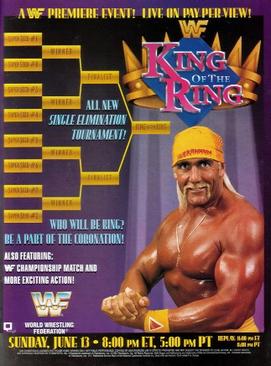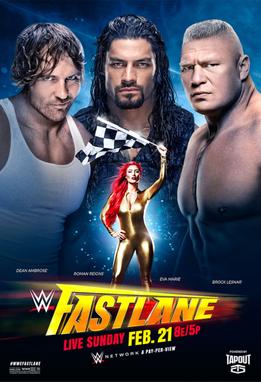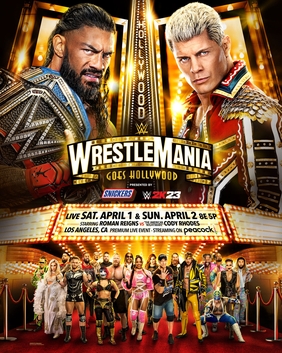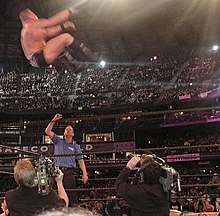
Terry Gene Bollea, better known by his ring name Hulk Hogan, is an American retired professional wrestler. He is widely regarded as the most recognized wrestling star worldwide and the most popular wrestler of the 1980s, as well as one of the greatest professional wrestlers of all time.

WrestleMania is a professional wrestling pay-per-view (PPV) and livestreaming event held annually between mid-March and mid-April by the American company WWE, the world's largest professional wrestling promotion. Since premiering in 1985, 39 editions have been held, with its most recent 39th edition occurring at SoFi Stadium in Inglewood, California on April 1 and 2, 2023. WrestleMania was WWE's first-ever PPV produced and is the most successful and longest-running professional wrestling event in history. The event has been shown through PPV since 1985, and has been available to livestream through the WWE Network since 2014 and Peacock since 2021. WrestleMania was conceptualized by WWE executive chairman Vince McMahon and named by ring announcer and WWE Hall of Famer Howard Finkel. It is the company's flagship event and along with Royal Rumble, SummerSlam, Survivor Series, and Money in the Bank, it is referred to as one of the "Big Five", WWE's five biggest annual events of the year.

The New World Order was an American professional wrestling faction that originally consisted of "Hollywood" Hulk Hogan, Scott Hall, and Kevin Nash.

Charles Wright, better known under his ring name The Godfather, is an American professional wrestler. He is best known for his tenure with the World Wrestling Federation throughout the 1990s and early 2000s, and underwent several gimmick changes; the most notable were Papa Shango, Kama, Kama Mustafa, The Godfather and The Goodfather.

Sidney Raymond Eudy is a retired American professional wrestler, better known by his ring names Sid Justice, Sid Vicious, and Sycho Sid in World Championship Wrestling and the World Wrestling Federation.

WrestleMania 18 was the 18th annual WrestleMania professional wrestling pay-per-view (PPV) event produced by the World Wrestling Federation. It took place on March 17, 2002, at the SkyDome in Toronto, Ontario, Canada, the second WrestleMania at that venue after WrestleMania VI in April 1990. The event marked the final WrestleMania event held under the WWF name and the Attitude Era, as the company was renamed to World Wrestling Entertainment (WWE) in May and entered the Ruthless Aggression Era later that year. It was also the last WrestleMania held before the introduction of the brand extension just a week after the event. The record-breaking attendance for the SkyDome of 68,237 grossed approximately $6.1 million CAD. WrestleMania weekend also included WWF Fan Axxess at the Canadian National Exhibition's Automotive Building.

WrestleMania XIX was the 19th annual WrestleMania professional wrestling pay-per-view (PPV) event produced by World Wrestling Entertainment (WWE). It featured wrestlers from the promotion's Raw and SmackDown! brand divisions. The event took place at Safeco Field in Seattle on March 30, 2003, becoming the first WrestleMania held in the state of Washington. A record-breaking 54,097 fans from all 50 states and numerous countries around the world at Safeco Field resulted in ticket earnings of $2.76 million.

WrestleMania VIII was the eighth annual WrestleMania professional wrestling pay-per-view (PPV) event produced by the World Wrestling Federation. It took place on April 5, 1992, at the Hoosier Dome in Indianapolis, Indiana in the United States. Nine matches were shown during the live broadcast, with one dark match occurring before the event.

WWF WrestleMania: Steel Cage Challenge is a professional wrestling video game based on the World Wrestling Federation (WWF), released in 1992 by Acclaim Entertainment for the Nintendo Entertainment System and in 1993 for the Master System and the Game Gear handheld console. The NES version was subsequently released as a handheld TV game in 2018 under the name WWE WrestleMania: Steel Cage Challenge, with all references to the "WWF" name and logo replaced by "WWE".

The 2005 SummerSlam was the 18th annual SummerSlam professional wrestling pay-per-view (PPV) event produced by World Wrestling Entertainment (WWE). It was held for wrestlers from the promotion's Raw and SmackDown! brand divisions. The event took place on August 21, 2005, at the MCI Center in Washington, D.C. Nine matches were contested at the event, including one on the Sunday Night Heat pre-show.

The 1997 Royal Rumble was the 10th annual Royal Rumble professional wrestling pay-per-view (PPV) event produced by the World Wrestling Federation. It took place on January 19, 1997, from the Alamodome in San Antonio, Texas. As has been customary since 1993, the Royal Rumble match winner received a world championship match at that year's WrestleMania. For the 1997 event, the winner received a match for the WWF Championship at WrestleMania 13. The main event saw Shawn Michaels defeat Sycho Sid to win the WWF Championship. The main match on the undercard was the 1997 Royal Rumble match, which Stone Cold Steve Austin won after last eliminating Bret Hart. Additionally, Vader defeated The Undertaker, and Hunter Hearst Helmsley defeated Goldust to retain the WWF Intercontinental Championship.

The 2003 No Way Out: Screwjob was the fifth No Way Out professional wrestling pay-per-view (PPV) event produced by World Wrestling Entertainment (WWE). It was held for wrestlers from the promotion's Raw and SmackDown! brand divisions. The event took place on February 23, 2003, at the Bell Centre in Montreal, Quebec, Canada. It was the first No Way Out produced under the WWE name, after the promotion was renamed from World Wrestling Federation (WWF) to WWE in May 2002, as well as the first held under the first brand extension that began in March 2002. This was also the first WWE pay-per-view held in Montreal since the infamous Montreal Screwjob at Survivor Series in 1997.

The 1993 King of the Ring was the inaugural King of the Ring professional wrestling pay-per-view (PPV) event produced by the World Wrestling Federation and featured the seventh King of the Ring tournament. It was the first of ten King of the Ring events produced as pay-per-views; an 11th exclusively aired on the company's livestreaming service, the WWE Network. The inaugural event took place on June 13, 1993, at the Nutter Center in Dayton, Ohio. Ten matches were held at the event.

The 2003 Judgment Day was the fifth Judgment Day professional wrestling pay-per-view (PPV) event produced by World Wrestling Entertainment (WWE). It was held for wrestlers from the promotion's Raw and SmackDown! brand divisions. The event took place on May 18, 2003, at the Charlotte Coliseum in Charlotte, North Carolina. This event is notable in the fact that is the last non-Big Four pay-per-view that was not brand-exclusive until Backlash 2007.

The 2002 Backlash was the fourth Backlash professional wrestling pay-per-view (PPV) event produced by the World Wrestling Federation. It was held for wrestlers from the promotion's Raw and SmackDown! brand divisions. The event took place on April 21, 2002, at Kemper Arena in Kansas City, Missouri—it was the first PPV event to be held at Kemper Arena since Over the Edge in May 1999, in which Owen Hart, competing as The Blue Blazer, died after falling 78 feet from a harness to the ring. It was the company's very first PPV held following the introduction of the brand split. It was the fourth consecutive Backlash presented by Castrol GTX and the final Backlash held under the WWF name as the promotion was renamed to World Wrestling Entertainment (WWE) the following month. Thus, it was the last WWF PPV of the Attitude Era. The concept of the pay-per-view was based around the backlash from WrestleMania X8.

The 2002 King of the Ring was the 10th annual King of the Ring professional wrestling pay-per-view (PPV) event produced by World Wrestling Entertainment (WWE) that featured the 16th King of the Ring tournament. It took place on June 23, 2002, at the Nationwide Arena in Columbus, Ohio. It was the first King of the Ring PPV and tournament held under the WWE name after the promotion had been renamed from World Wrestling Federation (WWF) to WWE the previous month. It was also the final King of the Ring pay-per-view event and the only King of the Ring pay-per-view to feature the Raw and SmackDown! brand divisions following the introduction of the brand extension in March. It was also the final King of the Ring event to be produced as a pay-per-view, although the King of the Ring tournament has continued to be held periodically. The King of the Ring's June PPV slot was replaced by Bad Blood in 2003. One further King of the Ring event was held in 2015, but not on PPV.

WrestleMania XXX was the 30th annual WrestleMania professional wrestling pay-per-view (PPV) and livestreaming event produced by WWE. It took place on April 6, 2014, at the Mercedes-Benz Superdome in New Orleans, Louisiana and was the first WWE event simultaneously broadcast live on PPV and livestreamed on WWE's subscription streaming service, the WWE Network, which launched in February. WWE Hall of Famer Hulk Hogan served as the host of the event.

WrestleMania 32 was the 32nd annual WrestleMania professional wrestling pay-per-view (PPV) and livestreaming event produced by WWE. It took place on April 3, 2016, at the AT&T Stadium in the Dallas suburb of Arlington, Texas. This was the last WrestleMania to be held before the reintroduction of the brand extension in July, which introduced another world championship, the WWE Universal Championship, thus it was also the last WrestleMania to feature one world championship. It was also the third WrestleMania to be held in the state of Texas.

The 2016 Fastlane was the second Fastlane professional wrestling pay-per-view (PPV) and livestreaming event produced by WWE. It took place on February 21, 2016, at Quicken Loans Arena in Cleveland, Ohio. This was the last Fastlane to be held before the reintroduction of the brand extension in July.

WrestleMania 39 was the 39th annual WrestleMania professional wrestling pay-per-view (PPV) and livestreaming event produced by WWE. It was held for wrestlers from the promotion's Raw and SmackDown brand divisions. The event took place as a two-night event on April 1 and 2, 2023, at SoFi Stadium in Inglewood, California—the original location of WrestleMania 37 before the COVID-19 pandemic forced it to be relocated. WWE wrestler The Miz and rapper Snoop Dogg served as the hosts for the event.



















